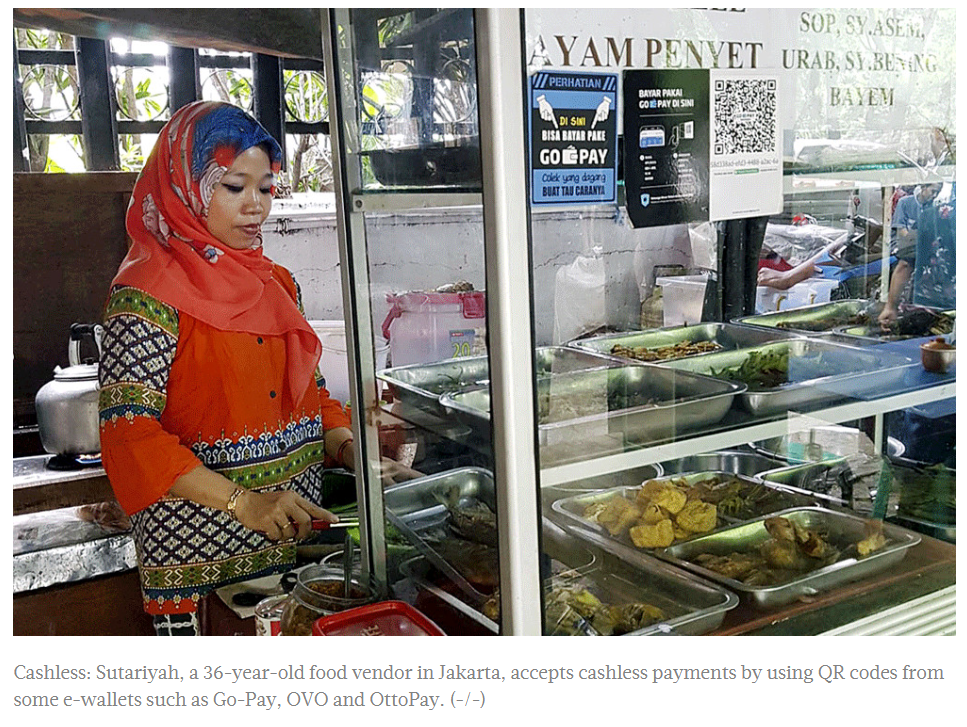Indonesia: Digital divide causes disparities in COVID-19 relief distribution: Experts
Indonesia’s low internet penetration rate has impeded the effectiveness of the government’s COVID-19 social assistance programs as the government relies heavily on online platforms to deliver its relief programs, such as online training and cash disbursement.
The Institute for Development of Economics and Finance (INDEF) argued that the country’s digital divide could further deepen inequalities during the COVID-19 outbreak as social assistance such cash aid and pre-employment card progams were being delivered via online platforms.
“The programs are not inclusive and are more beneficial for the program providers,” said INDEF researcher Nailul Huda during a webinar on April 15.
According to a 2018 survey from the Indonesian Internet Providers Association (APJII), internet usage in the country’s most populous island of Java was 55.7 percent, higher than the rest of the country at just 44.3 percent, with most users living in urban areas.
Disparities in internet literacy are also present across generations and occupations, with many people aged 45 years old and older and manual laborers, among others groups, not considering themselves to be internet users.
Digital adoption in the country, especially outside Java, has continued to lag, even though the country’s digital infrastructure, such as distribution of electricity and cellular signals, has been deemed adequate, according to the East Ventures Digital Competitiveness Index.
Similarly, the Economist Intelligence Unit (EIU) ranked Indonesia 57th out of 100 countries on its Inclusive Internet Index, scoring lowest for internet affordability and availability.
“Therefore, the digital distribution of aid is not suited to the country’s population profile,” Nailul said, adding that the government should prioritize direct cash and staple food disbursement to help those most affected by the pandemic.
He further criticized the preemployment card program, saying that eight partner platforms, including Skill Academy by Ruangguru, Pintaria and MauBelajarApa, would receive Rp. 3.7 trillion (US$237 million) in profit collectively.
Nailul said that if the Rp 5.6 trillion in spending for online training programs was split evenly by eight, each platform would receive Rp 700 billion. Indef estimated that the budget needed to produce video content was Rp 243 billion, which leaves each platform with Rp 457 billion in income.
If the Rp 3.7 trillion in aid was distributed in cash, each person in the preemployment program could receive up to Rp 2.9 million instead of the current Rp 2.4 million, or the benefits of the preemployment card program could be distributed to 6.9 million beneficiaries instead of 5.6 million, he said.
Meanwhile, another Indef researcher Izzatun Al Farras Adha said that if the government wanted to increase broadband internet access across the country, it should lower taxes for internet service providers or include telecommunication companies as recipients of the government’s next economic stimulus package.
APJII members have previously asked the Communications and Information Ministry to delay payments of telecommunication services fees (BHP) and universal service obligation (USO) until next year, arguing that even though people were spending more time online during pandemic, internet service providers were still losing profits.
“Even though people are working from home and internet traffic has risen by 15 percent, we are losing profits from our business-to-business clients as offices and hotels are closed,” said APJII chairman Jamalul Izza on Tuesday.
He said that more than half of all APJII members were small-scale internet service providers that mostly served corporations.
Similarly, Indonesian Cellular Telecommunications Associations (ATSI) chairman Ririek Adriansyah also said that ATSI members were reporting flat revenue despite the fact the pandemic was seen as a growth opportunity for the telecommunication sector.
“We have given many bonuses, such as free internet quota, especially for access to education platforms. We have seen an increase in internet traffic, but not in our revenue,” he said.
Source: https://www.thejakartapost.com/news/2020/04/27/digital-divide-causes-disparities-in-covid-19-relief-distribution-experts.html


 English
English




